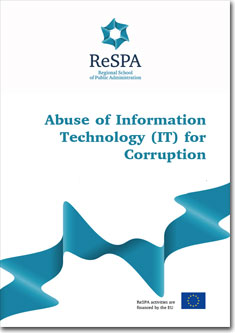Abuse of Information Technology (IT) for Corruption
Published 30-09-2015
The study investigates how Information Technology (IT) has been abused for Corruption in the Western Balkan region.
As an eGovernment expert I co-authored this study together with national experts from seven Balkan countries and international anti-corruption exerts Dr. Tilman Hoppe and Vera Devine.
The study was launched on 26-27 November 2014 on an eGovernment networking event in Tirana, Albania held by the Regional School of Public Administration (ReSPA) .
Download
 Abuse of Information Technology (IT) for Corruption.pdf
Abuse of Information Technology (IT) for Corruption.pdf
The report can also be downloaded from the ReSPA website's document library.
Abstract
Numerous publications exist on how corruption can be prevented through good use of IT, such as online public registries, transparency of asset declarations, or e-procurement. However, for the reverse usage of IT as a tool for corruption, little if any literature exists. This scarcity of guidance is in stark contrast to the “United Nations Convention against Corruption” (UNCAC) which calls, in Article 48 par. 3, for States Parties to “endeavour to cooperate within their means to respond to offenses covered by this Convention committed through the use of modern technology.”
This Comparative Study aims to provide, for the first time, concrete guidance by showing cases of abuse of “modern technology” (IT) for corruption offenses and on the possible steps that can be taken to protect against such abuses. It focuses only on corruption risks specifically related to IT. For example, corrupt procurement of IT or vendor lock-in are corruption risks which can occur with any other tool such as procuring trains for public transportation or possible vendor lock-ins; thus, they are not corruption risks specifically related to IT.
The reader of this Study can benefit from concrete cases illustrating how corruption offenders exploit weaknesses in IT structures for their personal advantage. The real life cases of IT corruption, as well as the good examples of preventing and detecting them, will provide inspiration to experts dealing with corruption prevention as well as experts in charge of IT security.
ReSPA has been active in both fields for years – integrity as well as e-government. With its regional networks of experts on both issues it is in an excellent position to bring both disciplines together for mutual benefit. In light of its relevance for the implementation of the UNCAC, the impact of this Study will affect the Western Balkan region and at the same time go internationally well beyond the region to any of the 172 parties to the UNCAC.
Study structure
Section 1 - Real life cases on abuse of IT for corruption
- Albania
- Bosnia & Herzegovina
- Croatia
- Kosovo
- Macedonia
- Montenegro
- Serbia
- Section 2 - Safeguards against abuse of IT
- Introduction
- Albania
- Bosnia & Herzegovina
- Croatia
- Kosovo
- Macedonia
- Montenegro
- Serbia
- Lessons learnt - Safeguarding against using corruption using ICTs in the Western Balkans public sector
- Section 3
- Policy recommendations on mitigating corruption risks in IT



